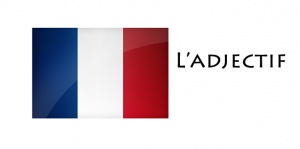Difference between revisions of "Language/French/Grammar/Adjectives"
| Line 1: | Line 1: | ||
[[File:adjectif-en-français.jpg|thumb]] | Bonjour, Good morning | ||
Concerne l'adjectif masculin singulier "Beau" qui devient "Bel" lorsque le nom masculin singulier auquel il se rapporte commence par une voyelle ou un "h" muet | |||
Exemples | |||
Un bel oiseau et non un beau oiseau. | |||
Le violon est un bel instrument- un bel ustensile - un bel enfant- un bel appartement- un bel exemple.....etc.... | |||
Il y a une exception quand le nom commun commence par un "h" | |||
Exemples: | |||
Un bel hortensia- un bel hôtel- un bel hippodrome.....etc... | |||
§§§§§§§§§§§§§§§§§§§§§§§§§§§§§§§ | |||
Concerns the adjectiv "Beautiful" wich becomes "beautiful" before singular masculin common name wich begins with vowel or aspirated mute "h" | |||
For example | |||
A beautiful bird- The violin is a beautiful instrument- a beautiful children- a nice apartement. | |||
There are exeption when the name begins with "h" | |||
for example: | |||
A beautiful hydrangea - a beautiful racecourse- a beautiful hotel[[File:adjectif-en-français.jpg|thumb]] | |||
<div style="font-size:300%;"> The adjective (L'adjectif).</div> | <div style="font-size:300%;"> The adjective (L'adjectif).</div> | ||
Bonjour ! French learners, | Bonjour ! French learners, | ||
| Line 43: | Line 71: | ||
Here is a list of the most common adjectives, with their feminine : | Here is a list of the most common adjectives, with their feminine : | ||
{| class="wikitable" | {| class="wikitable" | ||
Revision as of 13:03, 4 July 2021
Bonjour, Good morning
Concerne l'adjectif masculin singulier "Beau" qui devient "Bel" lorsque le nom masculin singulier auquel il se rapporte commence par une voyelle ou un "h" muet
Exemples
Un bel oiseau et non un beau oiseau.
Le violon est un bel instrument- un bel ustensile - un bel enfant- un bel appartement- un bel exemple.....etc....
Il y a une exception quand le nom commun commence par un "h"
Exemples:
Un bel hortensia- un bel hôtel- un bel hippodrome.....etc...
§§§§§§§§§§§§§§§§§§§§§§§§§§§§§§§
Concerns the adjectiv "Beautiful" wich becomes "beautiful" before singular masculin common name wich begins with vowel or aspirated mute "h"
For example
A beautiful bird- The violin is a beautiful instrument- a beautiful children- a nice apartement.
There are exeption when the name begins with "h"
for example:
A beautiful hydrangea - a beautiful racecourse- a beautiful hotel
Bonjour ! French learners,
In this article you will discover how to use adjectives in French.
As we know adjectives are those words that add information about the name they accompany.
- le chien est rapide = the dog is fast
- le chien blanc est rapide = the white dog is fast
Here are some examples:
Singular
- le grand bâtiment = the large building
- la grande ville = the big city
- un grand appartement = a large apartment
Plural
- les grands bâtiments = the large buildings
- les grandes villes = the big cities
- de grands appartements = large apartments
Another thing to consider is that the plural article "des" becomes "de" when it is before the adjective:
- Mon bâtiment a de grands appartements = My building has large apartments.
Sentense construction
Construct sentences with adjectives is very simple:
- Ce vélo est rapide = This bike is fast.
- Le ciel est bleu = The sky is blue
Adjectives are placed in front or behind a name:
- un homme pauvre = a poor man
- un pauvre homme = a poor man
Feminine
The feminine of adjectives is formed by adding the ending "e" to the masculine adjective. However, there are some exceptions. Look at The Adjective. Women's training to learn more about this.
Here is a list of the most common adjectives, with their feminine :
| L'ADJECTIF | ||||
|---|---|---|---|---|
| Masculin | Feminin | Masculin | Feminin | Traduction |
| beau | belle | laid | laide | beautiful / ugly |
| bon | bonne | mauvais | mauvaise | good / bad |
| long | longue | court | courte | Long / short |
| grand | grande | petit | petite | large / small |
| lent | lente | rapide | rapide | slow / fast |
| ouvert | ouverte | fermé | fermée | open / closed |
| jeune | jeune | vieux | vieille |
young / old |
| plein | pleine | vide | vide | full / empty |
| cher | chère | bon marché | bon marché | expensive / cheap |
| bas | basse | haut | haute | low / high |
| facile | facile | difficile | difficile | easy / hard |
| vrai | vraie | faux | fausse | true / false |
| froid | froide | chaud | chaude | cold / hot |
| léger | légère | lourd | lourde | light / heavy |
| nouveau | nouvelle | ancien | ancienne | new / old |
